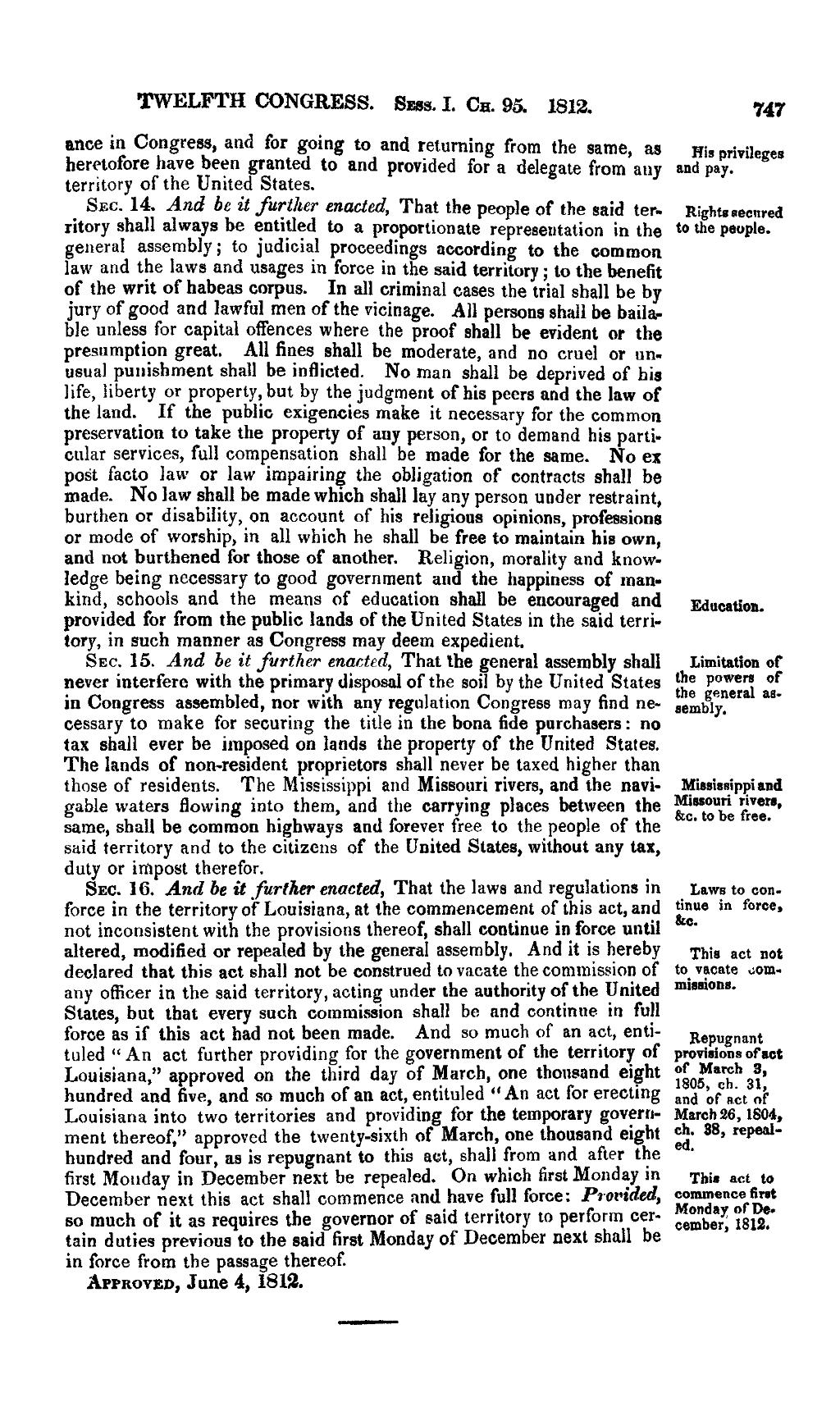His privileges and pay.ance in Congress, and for going to and returning from the same, as heretofore have been granted to and provided for a delegate from any territory of the United States.
Rights secured to the people.Sec. 14. And be it further enacted, That the people of the said territory shall always be entitled to a proportionate representation in the general assembly; to judicial proceedings according to the common law and the laws and usages in force in the said territory; to the benefit of the writ of habeas corpus. In all criminal cases the trial shall be by jury of good and lawful men of the vicinage. All persons shall be bailable unless for capital offences where the proof shall be evident or the presumption great. All fines shall be moderate, and no cruel or unusual punishment shall be inflicted. No man shall be deprived of his life, liberty or property, but by the judgment of his peers and the law of the land. If the public exigencies make it necessary for the common preservation to take the property of any person, or to demand his particular services, full compensation shall be made for the same. No ex post facto law or law impairing the obligation of contracts shall be made. No law shall be made which shall lay any person under restraint, burthen or disability, on account of his religious opinions, professions or mode of worship, in all which he shall be free to maintain his own, and not burthened for those of another. Religion, morality and knowledge being necessary to good government and the happiness of mankind, schools and the meansEducation. of education shall be encouraged and provided for from the public lands of the United States in the said territory, in such manner as Congress may deem expedient.
Limitation of the powers of the general assembly.
Mississippi and Missouri rivers, &c. to be free.Sec. 15. And be it further enacted, That the general assembly shall never interfere with the primary disposal of the soil by the United States in Congress assembled, nor with any regulation Congress may find necessary to make for securing the title in the bona fide purchasers: no tax shall ever be imposed on lands the property of the United States. The lands of non-resident proprietors shall never be taxed higher than those of residents. The Mississippi and Missouri rivers, and the navigable waters flowing into them, and the carrying places between the same, shall be common highways and forever free to the people of the said territory and to the citizens of the United States, without any tax, duty or impost therefor.
Laws to continue in force, &c.
This act not to vacate commissions.
Repugnant provisions of act of March 3, 1805, ch. 31, and of act of March 26, 1804, ch. 38, repealed.
This act to commence first Monday of December, 1812.Sec. 16. And be it further enacted, That the laws and regulations in force in the territory of Louisiana, at the commencement of this act, and not inconsistent with the provisions thereof, shall continue in force until altered, modified or repealed by the general assembly. And it is hereby declared that this act shall not be construed to vacate the commission of any officer in the said territory, acting under the authority of the United States, but that every commission shall be and continue in full force as if this act had not been made. And so much of an act, entituled “An act further providing for the government of the territory of Louisiana,” approved on the third day of March, one thousand eight hundred and five, and so much of an act, entituled “An act for erecting Louisiana into two territories and providing for the temporary government thereof,” approved the twenty-sixth of March, one thousand eight hundred and four, as is repugnant to this act, shall from and after the first Monday in December next be repealed. On which first Monday in December next this act shall commence and have full force: Provided, so much of it as requires the governor of said territory to perform certain duties previous to the said first Monday of December next shall be in force from the passage thereof.
